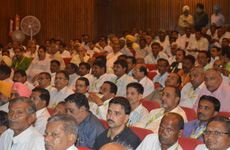By I C Naik
Indian Constitution is a reflection of co-operative federalism wherein the Centre has an upper age consciously built in to the Scheme of Centre State Relations. The intention was to build national harmony with diversity to suit local variations. The Indian Constitution has withstood many political assaults thanks to enlightened judiciary which has kept its stature in high esteem with developing impeccable concepts like basic structure of the Constitution of India for example. This has established that justice is not a local issue. Laws and systems across the entire Indian territory must command confidence of every citizen practically of the uniform steadfast level. In this background a stark contrast in the law and practice of dispute settlement in fast growing cooperative sector is worth having a look at.
Our study is about the two States Maharashtra and Karnataka (formerly Bombay and Mysore respectively) are the two pioneer States in India’s co-operative movement. In a recent case [Para 8 of the order dated March 19, 2015 [(2015) 42 SCD 494] the S C acknowledged that the National Policy on Cooperatives 2002 has been provided a Constitutional frame by the Indian Parliament vide the 97th Constitutional Amendment http://www.scdecision.in/volume/42/494. The National Policy acknowledged various constraints Indian co-operative movement was facing for example “excessive bureaucratic and governmental controls” and recognized the need for suitable legislative and policy support. Accordingly Policies were laid down at paragraph 7 on shifting the Government attitude of Control to Regulation.
The Karnataka Co-Operative Societies Act, 1959 U/S 70 provided “Notwithstanding anything contained in any law for the time being in force, if any dispute touching the constitution, management, or the business of a co-operative society arises such dispute shall be referred to the Registrar for decision and no civil or labour or revenue court or Industrial Tribunal shall have jurisdiction to entertain any suit or other proceeding in respect of such dispute.
Sub-Section (2) specifies an inclusive list of the matters which are deemed to be disputes touching the constitution, management or the business of a co-operative society. Sub-Section (3) declares the Registrar as the ultimate undisputable decision maker on any question whether a dispute was touching the constitution, management or the business of a co-operative society.
In stark contrast, there is long legislative history of present day dispute settlement system in the State of Maharashtra. The first Provincial cooperative societies Act the Bombay Co-operative Societies Act 1925 had introduced (U/S 54 ) the arbitration system providing for three arbitrators to give award to settle any dispute. Amendment to this Act in the year 1948 enabled the aggrieved party to appeal to the Tribunal for setting aside the award or for modifying it.
The MCS Act 1960 introduced a full length system of settlement of disputes by Cooperative Court and Cooperative Appellate Court providing for all minutest details U/S 91-97 supported by the MCR 1961 namely Rule 77, 77A-77F and 104. The scope of this system covered more or less same categories of dispute as are being handled by the Registrar in Karnataka. The Cooperative Courts have powers like Civil Court under the Code of Civil Procedure. For example U/S Section 94 a power to summon and enforce attendance of witness and compel the parties to give evidence on oath, affirmation or affidavit and compel the production of documents. U/S 95 the Court has a power to order attachment of property, U/S 96 the Court can make award on the dispute as well as provide for costs and other incidental reliefs. Aggrieved party has a right to file appeal before the Co-operative Appellate Court.
Independence of cooperative judiciary came under attack of the executive in 1983 when the executive was officially permitted to undermine the independence of the Judiciary. The Bombay High Court [in Maharashtra Co-Operative … vs State Of Maharashtra 24 July, 1990 Bom CR 437 Author: M Pendse J. ] had 25 years ago, thwarted this attempt, when it was hearing a complaint by certain members of the Maharashtra Co-operative Courts’ Bar Association to this effect.
The High Court observed “The principal challenge is to the Government Resolution dated April 30, 1983 by Government of Maharashtra, declaring the Commissioner for Co-operation and Registrar, Co-operative Societies, as controlling Officer for administration purposes and for writing confidential reports on the working of Judges of Co-operative Courts.” The Court order starts with stern observations namely : “The independence of judiciary is doubtless a basic structure of the Constitution and the concept that the executive should have no control to regulate the working of Courts is a doctrine accepted for over century in all the civilized countries.”
Justice M L Pendse recalled the history of dispute settlement machinery in the State at length starting with the system introduced under Bombay Co-operative Societies Act 1925.
